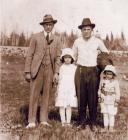1
Mary Skrypnyk tells about her parents-immigrants from Ukraine.My father, Theodore Skrypnyk, was a miner who worked in the Hollinger Gold Mine which, at that time, was considered to be one of the largest mines in the world. He came to Canada from Kyselev in Bukovyna when he was a young seventeen year-old boy. My mother, Olena Sawdan, came to Canada from Hnisdychev in Galicia when she was sixteen years old. They married and raised a family in Timmins, Ontario. I was the eldest of the children. Later on, our family left Timmins. Until then I attended Ukrainian children's school.
My parents played in the drama group. I remember one of the winter evenings when our parents bundled us up in warm clothing and took us with them to the Ukrainian Labour Temple where they were rehearsing their roles for theatrical productions. We were taken to the hall on sleds, one being drawn by my father and the other by my mother. In the Ukrainian Labour Temple, we were placed on tables in the basement where there already were other children. We slept side by side while the parents were rehearsing.
But when the day of the stage production came around, we forgot all about the tables in the basement and the rehearsals. Excited, we proudly sat in the front rows, but were unable to recognize our parents who wore make-up and were dressed in the strange costumes of the characters that they were portraying on the stage. My mother played in dramatic roles, while my father did the opposite: playing in comic roles and reciting humorous monologues.
This kind of activity was very dear to my parents and for this reason they were sorry to leave Timmins and settle on a farm in the Niagara Peninsula, in southern Ontario, halfway between Thorold and Welland. We left Timmins so that my father would avoid the risk of contracting silicosis. This terrible miners' disease was quite common at the time, ruining the health of miners and hastening their death, and giving rise to family tragedies. Young mothers were left with their children without any kind of social insurance. The fight for such protection was just beginning at the time.
Having settled on the farm, our parents did everything they could so as not to deprive us of the cultural life that we had enjoyed in Timmins. Our father continued to teach us the Ukrainian language. During the long winter evenings, he read plays to us by Mykhailo Starytsky, Marko Kropyvnytsky, Myroslav Irchan and others. By the light of the kerosene lamp, he read to us from works by Taras Shevchenko, Ivan Franko, Lesya Ukrainka and Panas Myrny. He regularly drove us in his old Ford to see concerts and dramatic performances in Thorold and Welland which were put on by amateur ULFTA collectives in those localities. My father also enjoyed recounting folk tales. This was an inseparable part of our daily lives.
The Ukrainian population in this district was steadily increasing. My father helped organize a branch of the Workers' Benevolent Association. A Ukrainian children's school was started, with the instruction being given in private homes. One-act plays and short concerts, in which I took part with other children, were also put on in private homes.
Life during those years was hard and complicated. Our farm was burdened with a heavy mortgage; the public school was a mile and a half away from our house. Ukrainians were still "foreigners" to the local inhabitants. We grew up in surroundings where the words "foreigners" and "hunky" often were used by our neighbours and by their children with whom we associated. On top of that, we suffered a family tragedy: my mother died at the age of thirty-three. I was only twelve and had just finished public school. It fell to my lot to be the housekeeper and this was the end of my formal schooling. But being something of a bookworm, I went on reading everything that I could set my hands on.
The economic difficulties compelled me to leave home in search of work. That was when I was fifteen. It was hard for a young girl to find work. After searching for three months, I began to work at the Tucket Tobacco Factory in Hamilton, the notorious sweatshop where I earned $9.00 a week. I worked there for eight years. At the end, I was paid $12.00 a week.
MARY SKRYPNYK
TORONTO, ONTARIO
2
Mary Skrypnyk with her father, brother and uncle1919
Timmins, Ontario, Canada
 Credits:
Credits:Mary Skrypnyk